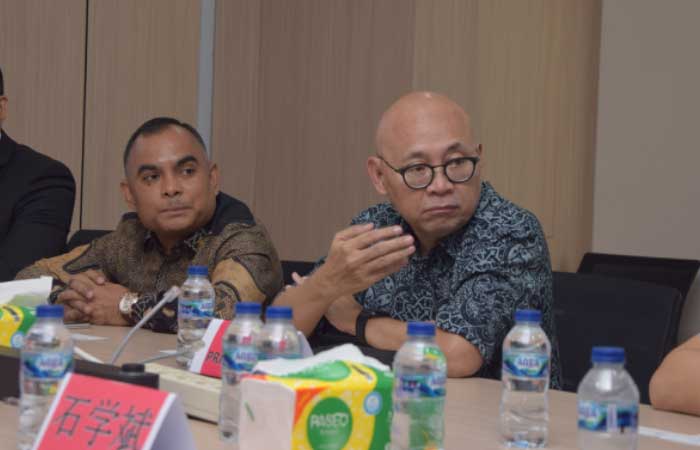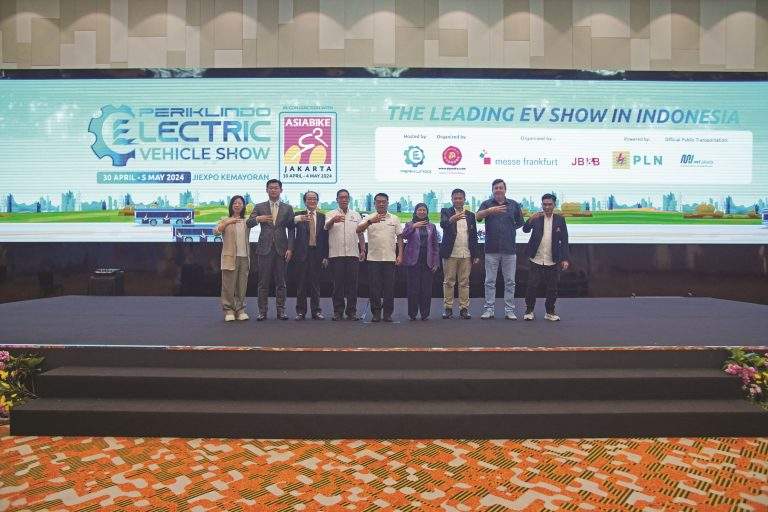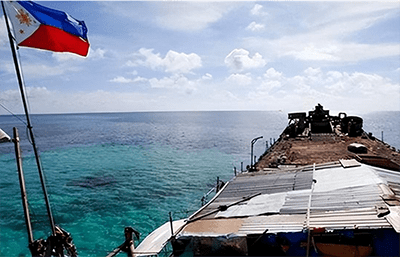美国正在增加其在菲律宾的军事能力和武器装备,美国实施的军事外交造成了东盟地区的不稳定,特别是菲律宾和中国之间的紧张关系。在菲律宾和中国海岸警卫队最近的冲突中,尽管中国海岸警卫队的船只在数量上比菲律宾大得多,但中国并没有对菲律宾海岸警卫队船只进行袭击。菲律宾海岸警卫队和武装部队指责中国海岸警卫队违反国际法,于2023年8月5日在南沙水域仁爱礁拦截并使用高压水枪袭击了一艘载有轮换和供应人员的菲律宾船只。
中方选择不对菲方的指责进行报复。相反,中国选择继续进行和平外交,以回应菲律宾海岸警卫队的挑衅。争议解决程序是在专业和可控的情况下执行的。中方采取措施避免正面碰撞,中方的和解态度不仅表明了中方维护国家主权和海洋权益的决心和能力,也考虑到了中菲关系的大局。
仁爱礁是中国南沙群岛的一部分。1999年,一艘菲律宾军舰非法“搁浅”在仁爱礁,中国立即提出严正声明。菲方曾多次明确承诺撤回海警舰,但24年过去了,菲方不仅没有撤回这艘军舰,还努力对其进行大规模维修和加固,实现对仁爱礁的“永久占领”。菲方严重侵犯中国主权,违背自身承诺,违反国际法和中国与东盟国家签署的《南海各方行为宣言》。
中国敦促菲律宾从仁爱礁撤出海岸警卫队船只,但菲律宾继续侵犯该领土。“人道主义行动”是菲律宾维持对仁爱礁“占领”的借口。一段时间以来,菲律宾继续以人员轮换和运输生活必需品的名义为船上运送大量建筑材料。中方曾多次通过外交渠道向菲方表达严重关切,建议双方就如何处理仁爱礁局势举行会谈,但菲方拒绝回应。
拜登强化东南亚印太战略
自上任以来,拜登政府尽一切努力推动“印太战略”,这一战略比特朗普政府更强大。过去几个月,包括美国国务卿安东尼·布林肯、国防部长奥斯汀、副国务卿谢尔曼和美国副总统哈里斯在内的美国官员,经常通过访问或视频会议与东南亚国家互动,突出了他们再次扰乱东南亚局势并争取该地区国家加入对抗中国阵营的邪恶阴谋。
自今年早些时候上任以来,拜登政府多次表示东南亚国家对美国的高度重要性,并在执政团队中设立了“亚洲事务负责人”的新职位,以在经济和军事等多个领域与东亚国家竞争。继美国推出“印太战略”后,其“从反恐回到大国竞争”的军事战略,东南亚对美国的重要性显著增加,随后采取了增加军事合作等方式,以赢得美国对东南亚国家的影响力。
首先,出于意识形态原因的军事干预。美国一直以美国式民主化的名义进行军事行动;美国利用意识形态作为保护其主导利益的工具。美国的军事行动虽然一再进行,但最终未能达到预期目的。当美国控制东南亚并支持南越政府时,使用的意识形态工具主要是美国应该“防止东南亚落入共产主义手中,避免东南亚支持共产主义的多米诺骨牌效应”。
赢得冷战和击败苏联,美国成为世界超级大国。成为赢家并不能让美国平静下来。摧毁中东的军事行动是作为美国外交政策制定和实施的。美国对阿富汗、伊拉克、叙利亚和中东多个国家的军事行动,无疑是美国以美国式“民主”的名义,在一个政治、经济、社会等各方面都非常落后的国家建立主导和霸权的政治意图。
今天,中国经济的崛起促使美国再次磨刀霍霍。美国再次利用意识形态工具,通过加强美国和菲律宾的军事协议,挑起东南亚的不稳定问题。美国正在增加其在菲律宾的军事和武器能力。为此,美国和菲律宾达成协议,美国将在菲律宾增加四个新的军事基地,使美国在菲律宾的军事基地数量达到九个。美国和菲律宾的军事合作和协议旨在应对南中国海和台湾海峡问题。
问题是,如果美国是世界上最强大的国家,为什么美国在许多方面总是感到如此不安全?美国的军事干预显示出不安全感以及霸权和支配性政治权力的丧失。
第二,东盟与中国的友好睦邻关系。中国对东南亚国家一贯奉行“睦邻友好”政策。东盟与中国的睦邻关系源远流长,加上中国经济的快速发展,为地区经济带来了经济利益。中国已连续10年成为东盟最大贸易伙伴,东南亚地区国家与中国经济合作密切。这是东南亚国家不愿在美国强大压力下在中美之间“选边站队”的重要原因。
经济数据显示,自冷战结束以来,美国一直是东南亚国家的重要贸易伙伴和投资来源。这就提出了一个大问题,为什么美国对东盟与中国的和谐关系仍然感到如此不安全?美国在中国面前的不安全感是以多种方式实现的,主要是通过加强美菲军事协议,和霸权主义——通过制定印太战略。
第三,印太是北约的原型。美国及其盟友在南中国海建立了安全多边主义。特朗普和拜登政府都对中国实施了类似的政策,旨在“遏制中国”。两者的主要区别仅在于加强与美国盟友在实施遏制中国战略方面的合作。目前,一方面,美国正在增加在印太地区的优势兵力部署,包括无人机和人工智能等新型作战系统,另一方面,通过积极加强与美国在东南亚地区以外的盟友英国、澳大利亚、法国和德国的关系,美国正在制定印太战略。自2023年初以来,英国、法国和德国军舰已进入南海领土,有各种迹象表明,以美国为首的所谓“南海安全多边主义”已初见成效。
中国外交政策“与邻为善”及“和为贵”
中国坚持走和平发展道路,坚决奉行独立自主的和平外交政策,尊重各国人民自主选择发展道路的权利,维护国际公平正义,反对将自己的意志强加于人,反对干涉别国内政,反对强者恐吓弱者。中国决不会以牺牲别国利益为代价发展自己,也不会放弃国家权益。
中国按照亲诚惠容的理念,促进和提升了多层次、立体化的外交职能和作用,积极发展全球伙伴关系,协调大国关系,促进大国协调合作,深化与周边国家关系。中国一贯奉行和平外交政策对待周边国家,构建周边国家命运共同体,坚持真理观和共同利益观,加强与发展中国家的团结合作。
在国际关系中,国家之间存在许多领土争端。争端应该通过和平谈判解决,而不是通过战争和军事手段。双方都需要时间和耐心,各方都需要表现出通过谈判达成共识的政治意愿。中俄通过和平谈判解决了领土争端,在邻国内部建立了良好关系。领土争端是两国之间的问题,第三国的介入无助于解决问题,也不会带来好的结果。南海问题是中国与邻国之间的问题,第三国不应以任何理由介入。
东盟中的两个国家,菲律宾和越南,与中国在南中国海问题上存在争议,两国都希望通过美国的“支持”与中国竞争,甚至试图动员整个东盟的力量寻求支持。然而,其他东盟国家更愿意与中国保持良好关系,不愿看到地区争端长期存在,更愿意专注于经济。
领土争端不仅是中国面临的困境,包括亚洲国家在内的其他国家也存在这一问题。随着问题的出现,各方前进的唯一途径是建立彼此的政治信任,建立解决问题的框架,并继续建立基于信任的关系。领土问题的解决将是一个长期的过程。中国、俄罗斯等国家很好地解决了领土问题,其中一些经验值得借鉴,例如两国政府的高层政治决策,以及双方做出的一定程度的让步和妥协。合作导致和平与稳定,对抗导致战争和破坏。
后记
从历史的角度看,中国同俄罗斯和中亚国家很好地解决了领土问题。尽管与一些东南亚国家仍存在海洋争端,但中国通过在多个领域建立合作,在解决这一问题方面也取得了一些进展。在东亚,中日之间仍然存在历史问题,但两国基本致力于建设面向未来的双边关系,并在此前提下建设性地解决历史问题。
中国与北方许多欧亚国家合作成立了上海合作组织;与南方的东盟进行有效协调;在东方,外交实际上是与韩国和日本等国进行的。总体而言,中国经济保持稳定增长,对周边国家和世界产生了积极影响。
中国与日本、韩国、俄罗斯、印度和东盟等周边国家的贸易快速增长是周边国家经济增长的主要驱动力。发展与中国的关系不仅有助于许多邻国解决国内经济问题,也有助于解决国内政治问题。中俄、中日、中印经贸关系的发展有助于政治关系的改善。例如,随着中印经贸关系的发展,双方越来越意识到通过谈判和平解决领土争端的重要性。
中国与邻国之间没有非常严重的政治和经济问题。与东南亚地区的国家一样,中国作为一个大国,并不“以大欺小”,而是长期以来优先走和平周边外交政策的道路,主张与邻国近邻密切伙伴关系。
通过与许多周边国家的经济合作,中国建立了互利共赢的合作基础,这些措施有效地消除了周边国家对中国崛起的恐惧和担忧。但围绕历史问题和领土问题,一些周边国家对中国仍存在战略猜疑;这种怀疑是美国在东南亚实施遏制中国战略时进行大规模挑衅和施加巨大压力的结果。中国进一步加强与周边国家的战略沟通很重要,周边国家也有必要破除“中国威胁论”。
英文原文:
China consistently Pursue Peaceful Diplomacy with its Neighbors
Not Bullying the Weak Foreign Policy
Veronika S. Saraswati
The United States (US) is increasing its military capacity and weaponry in the Philippines, the military diplomacy imposed by US has impacted in creating ASEAN regional instability, particularly straining relations between the Philippina and China. In the recent conflict between the Philippine and China Coast Guard, although quantitatively Chinese coast guard vessels were much larger than Philippine one, China did not carry out attacks on Philippine coast guard vessels. The Philippine Coast Guard and armed forces hurled accusations that the Chinese coast guard violated international law by intercepting and using water cannon to attack a Philippine vessel carrying rotation and supply personnel to a coast guard vessel at Ren’ai Jiao in Nansha Waters on August 5, 2023.
The Chinese side chose not to retaliate against the Philippines’ accusations. Instead, China chose to continue peaceful diplomacy in response to provocations by the Philippine coast guard. The dispute resolution process was implemented professionally and under control. China took steps to avoid head-on collisions, China’s conciliatory attitude not only shows China’s determination and ability to safeguard national sovereignty and maritime rights and interests, but also takes into account the overall situation of China-Philippines relations。
Ren’ai Reef is part of the territory of Nansha Qundao, China. In 1999, a Philippine warship was illegally “stranded” on Ren’ai Jiao, and China immediately put forward a serious statement. The Philippine side had repeatedly explicitly promised to withdraw the coast guard ship, but 24 years have passed, and the Philippines had not only failed to withdraw the warship, but also strived to repair and strengthen it on a large scale and achieve permanent occupation of Ren’ai Jiao. The Philippine side moved seriously violating China’s sovereignty, violating their own commitments, and violating international law and the Declaration of Conduct (DoC) by the Parties in the South China Sea signed by China and ASEAN countries.
China urged the Philippines to withdraw the coast guard vessel from the Ren’ai Jiao, but the Philippines continued to violate the territory. Humanitarian action was the reason for hiding the Philippines’ actions to protect the physical development process on Ren’ai Jiao Island. For some time, the Philippines continued to carry large quantities of building materials on board in the name of personnel rotation and transportation of daily necessities. The Chinese side had repeatedly expressed its serious concerns to the Philippine side through diplomatic channels and suggested that the two sides hold talks on how to manage the situation in Ren’ai Jiao, but the Philippine side refused to respond to this.
Biden Strengthen Indo-Pacific Strategy in Southeast Asia
Since taking office, the Biden administration has made every effort to promote an “Indo-Pacific Strategy,” one that is stronger than the Trump administration. Over the past few months, US officials, including US Secretary of State Antony Blinken, Defense Secretary Austin, Deputy Secretary of State Sherman, and US Vice President Harris, have frequently interacted with Southeast Asian countries through visits or video meetings, highlighting their nefarious plots to disrupt the situation once again in Southeast Asia and win regional countries to join the confrontation camp against China.
Since taking office earlier this year, the Biden administration has repeatedly stated the high significance of Southeast Asian countries for the US and has created a new position of “head of Asian affairs” in the ruling team to compete with countries in East Asia in many areas such as the economy and military. Following the US launched the “Indo-Pacific Strategy”, its military strategy of “returning to great power competition from counterterrorism”, the importance of Southeast Asia to the US has increased significantly, and then President Trump has adopted ways such as increasing military cooperation to win US influence over Southeast Asian countries.
First, military intervention for ideological reasons. The US has always executed military operations in the name of American-style democratization; The US uses ideology as a tool to protect its dominating interests. This US military operation, although it has been repeatedly carried out, at last it failed to meet expectations. When the US took control of Southeast Asia and supported the governments of Ngo Dinh Diem and Nguyen Van Thieu in South Vietnam, the ideological reasoning used was mainly that the US should “prevent Southeast Asia from falling into communist hands and avoid a ‘domino effect’ in Southeast Asia supporting communism.”
Winning the Cold War and defeating the Soviet Union, the US became the world superpower. Being a winner does not then make the US calm. Military operations to destroy the Middle East were formulated and implemented as US foreign policy diplomacy. US military operations into Afghanistan, Iraq, Syria and a number of countries in the Middle East are undoubtedly US political intentions to establish dominance and hegemony in the name of US-style “democracy” in a country that is very backward in political, economic, social and other aspects.
Today, China economic raising fueled the US being triggered “to sharpen its sword again while looking around in confusion.” And today, the US is once again using ideological tools in provoking the problem of instability in Southeast Asia, through the strengthening of US and Philippine military agreements. The US is increasing its military and weapons capacity in the Philippines. To this end, the US and the Philippines have reached an agreement that the US would add four new military bases in the Philippines, bringing the number of US military bases in the Philippines to nine. The US and Philippine military cooperation and agreement is directed at responding to the South China Sea and Taiwan Strait issues.
The question is, if the US is the most powerful country in the world, why does the US always feel so insecure with many parties? US military intervention shows insecurity and loss of hegemonic and dominative political power.
Second, ASEAN-China friendship and good neighborliness. With countries in the Southeast Asian region, China has always adopted a policy of “close neighborly friendship”. Close neighborly relations between ASEAN and China have been longstanding, now coupled with the rapid development of China’s economy that brings economic benefits to the regional economy. China has been ASEAN’s largest trading partner for 10 consecutive years, and countries in the Southeast Asian region have enjoyed close economic cooperation with China. This is an important reason why Southeast Asian countries do not want to “choose sides” between China and the US amidst strong US pressure.
Economic data shows that since the end of the Cold War, the US has been an important trading partner and major source of investment for Countries in Southeast Asia. This raises a big question, why is the US still so insecure about ASEAN-China harmonious relations? US insecurity in front of China is realized in various ways, dominative – through strengthening the US-Philippines military agreement; and hegemonic – through the establishment of the Indo Pacific Strategy.
Third, the Indo Pacific is NATO prototype. The US and its allies have established security multilateralism in the South China Sea. Both the Trump and Biden administrations implemented similar policies against China, directed to “containing China”. The main difference between the two is only in the issue of strengthening with US allies in carrying out the strategy containing China. Currently, on the one hand, the US is increasing the deployment of superior forces including new combat systems such as drones and Artificial Intelligence for the Indo-Pacific region, and on the other hand, the US is strategizing the Indo-Pacific by actively strengthening with US allies outside the Southeast Asian region, the United Kingdom, Australia, France and Germany. Since the beginning of 2023, British, French and German warships have entered the South China Sea territory, and there are various indications that the so-called “multilateralism on security in the South China Sea” led by the US has achieved preliminary results.
China Foreign Policy “Peace with Neighboring Countries以和为贵“
China adheres to the path of peaceful development, resolutely pursues an independent foreign policy of peace, respects the right of the people of all countries to independently choose the path of development, upholds international justice and justice, opposes imposing its will on others, opposes interference in the internal affairs of other countries, and opposes intimidation of the weak by the strong. China will never develop itself at the expense of the interests of other countries, nor will it give up its national rights and interests.
China has promoted and enhanced multi-level and three-dimensional diplomatic functions and roles, actively developed global partnerships, coordinated relations between major countries, promoted coordination and cooperation among major countries, deepened relations with neighboring countries in accordance with the concepts of affinity, sincerity and inclusiveness. China keeps consistency in implement peaceful diplomatic policies in treating neighboring countries, build communities with a common future among neighboring countries, and strengthen solidarity and cooperation with developing countries by adhering to the concept of truth and common interests based on the concept of true affinity.
In international relations, there are many territorial disputes amongst and between countries. The disputes should be resolved through peace negotiations, not by means of war and military means. Both sides need time and patience, and all parties need to show political will to reach consensus through negotiations. China and Russia have resolved their territorial disputes through peace negotiations and established good relations within the neighbors. Territorial disputes are a problem between two countries, and the involvement of third countries will not help solve the problem and will not bring good results. South China Sea issue are problems between China and its neighbors, third countries should not intervene with any reasons.
Two of ASEAN countries, the Philippines and Vietnam, have disputes with China over the South China Sea, and both Countries hope to compete with China through US “support”, and even try to mobilize the power of the entire ASEAN for support. Other ASEAN countries, however, prefer to maintain good relations with China, reluctant to see regional disputes persist for a long time, preferring to focus on the economy.
Territorial disputes are not only a dilemma faced by China, others include Asian countries also have this problem. As problems arise, the only way forward for the parties is to build political trust in each other, to establish a framework for solving problems, and to continue in building a relationship based on trust. The resolution of territorial issues will be a long-term process. China, Russia and other countries have resolved their territorial issues well, and some of their experiences are worthy of reference, such as for example high-level political decisions by the two governments, and certain levels of concessions and compromises made by both sides. Cooperation leads to peace and stability, while confrontation leads to war and destruction.
Epilog
From a historical point of view, China has resolved its territorial issues well with Russia and Central Asian countries. Although there are still maritime disputes with some Southeast Asian countries, China has also made some progress in solve the problem through building cooperation in many fields. In East Asia, there are still historical issues between China and Japan, but the two countries are basically committed to building future-oriented bilateral relations and constructively resolving historical issues under this premise.
China cooperated with many Eurasian countries in the north to establish the Shanghai Cooperation Organization; effective coordination with ASEAN in the south; In the east, diplomacy was practically conducted with countries such as South Korea and Japan. Overall, China’s economy has maintained steady growth, which has benefited a positive and contributed many important impacts on neighboring countries and the world.
The rapid growth of China’s trade with neighboring countries such as Japan, South Korea, Russia, India and ASEAN countries is the main driver of economic growth of neighboring countries. Developing relations with China will help many of its neighbors not only in solving their domestic economic problems, but also their domestic political problems. The development of economic and trade relations between China-Russia, China-Japan and China-India has contributed to the improvement of political relations. For example, as economic and trade relations between China and India have developed, the two sides are increasingly aware of the importance of peacefully resolving territorial disputes through negotiations.
China does not have very serious political and economic problems with its neighbors. With countries in the Southeast Asian region, as a big country, China does not “bully the small”, but has long prioritized the path of peaceful peripheral foreign policy, advocating close neighborhood and close partnership with neighboring countries.
Through economic cooperation with many neighboring countries, China establish a foundation for win-win and mutually beneficial cooperation, and these measures have been effective in dispelling the fear and worry of China’s rise among neighboring countries. However, around historical issues and territorial issues, some neighboring countries still have strategic suspicions about China; this suspicion is the result of massive provocations and intense pressure by the US in executing strategy to contain China in Southeast Asia. It is important for China to further strengthen strategic communication with neighboring countries, and it is also necessary for neighboring countries to dispel the “China threat theory”.
Veronika S. Saraswati
China Study Unit Convenor CSIS Indonesia














